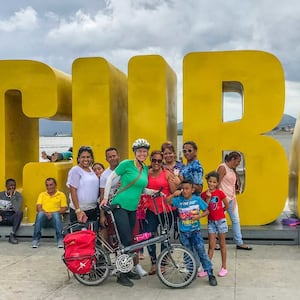When I first moved to Cuba as a photojournalist, I had virtually no idea of what I was getting into. From neighboring coups, suspected honey traps, salty spooks, and desperate migrants to dissidents, doctors, and Havana’s empty shelves, my stumbles across the Communist island would soon begin to reveal the nature of a world unmoored from the one I knew and left behind. Its subtle absurdities, Cold War underpinnings, and the hopes of a people in the throes of transition offered new insight about America’s old adversary, its place in history and where it was headed. And sometimes it would start with something as simple as a sink. In the fall of 2009, I would receive among my first lessons on private property in Communist Cuba. It is a story excerpted below from my new book, This is Cuba: An American Journalist Under Castro's Shadow.
My sink was gone.
Standing in the landing of my stairwell, I stared down into my bathroom at the hole in the ground that a porcelain basin and iron pipe once occupied. Am I crazy? I thought. There was definitely a sink here this morning.
After a month of living out of a hotel room at the Hotel Nacional, I had finally moved into a house in a leafy Havana suburb known as Miramar, once home to many of the capital’s wealthy residents. Upscale homes and mansions line the district’s broad avenues, the alter ego of Old Havana’s narrow and bustling cobblestone streets. Jagüey trees with their drooping branches and cascading roots dot a landscape greener and browner than much of the capital’s. And yet bizarre events like disappearing sinks offered a stark reminder that Miramar was still very much Cuba.
When foreigners moved out of these comparably lavish homes, it wasn’t uncommon for them to be gutted. Everything from curtain rods to light fixtures to sinks were up for the taking, often reused or resold on a black market that helped fill consumer gaps for residents contending with U.S. sanctions and a centralized Cuban economy that could make the Department of Motor Vehicles seem like a paragon of efficiency. In a system in which shortages and delays plague virtually every aspect of the supply chain, the human spirit inevitably devises ways to get what it needs. So by the time I lugged my suitcases across the threshold, every light bulb in the place had been snatched. From conversations with neighbors once familiar with the home’s inner sanctum, I deduced that the house had been rendered but a shell of its former self. Still, I had assumed that would stop once the new tenant moved in.
Wrong.
Not only had the place been stripped bare, but less than a week after I moved in, a major bathroom fixture was already missing. I had never lost a sink before. The rust-lined hole in the linoleum floor where iron and porcelain once met mocked me from the adjacent toilet.
Nothing quite replicates the look of those who spot you emerging from the bathroom knowing you haven’t yet washed. Will Weissert, a reporter for the Associated Press, would later move in with me and split the rent. And our sink-that-was quickly became a recurring joke.
Still, there had to be an explanation for the crime.
I phoned Raulito, our press liaison at Cuba’s Foreign Ministry. A middle-aged bureaucrat with a penchant for afternoon mojitos and making journalists pay for them, Raulito Gonzalez Hernandez didn’t often make things happen for you, but he could easily make things not happen—which made the occasional mojito splurge well worth it.

“Hola, Raulito,” I said as he answered his phone with a customarily staccato, “Oigo?”
My ensuing question seemed ridiculous. But there are only so many ways one can bring up a sink theft. So I just came out with it. “I feel strange for even asking this,” I said. “But did someone take my sink?” I didn’t really have any idea of who else to ask. And I expected him to brush me off for wasting his time.
Instead, he let out an audible sigh and replied, “Yes. It was broken.”
And there you have it. It wasn’t vandals or local thieves who crawled in through the window, wrenching the bloody thing off its mount before speeding away. No. It was the government. Some official work order had been issued, I assumed, to be served likely when authorities knew I was at work. And the workers simply let themselves in, presumably with a key. They just took it. What’s more, Raulito was somehow in on it. He acknowledged as much in a “what are you going to do about it?” sort of tone over the phone.
Rendered momentarily speechless, I regained composure. “Raulito, it was not broken. I used it this morning.”
“Well, I understand it was broken,” he replied.
To his credit, the man didn’t mince words. I had asked, and he had answered. And for a moment I just let that hang between us, coming to grips with this bizarre new world I had stumbled into where uninvited sink removal by government officials was a thing.
“Okaaaay,” I said. “Am I going to get it back?”
“Well, you know, Ariosto,” he said. “This is Cuba.”
“What does that actually mean?” I asked.
Ariosto. Unless it’s Fidel or Raul, Cubans tended to call people by their last names. I waited, expecting some sort of explanation beyond the bald-faced lie that it had been removed because it was broken.
“Ariosto . . . Is there anything else?” Then, nothing. He stopped talking. That was it. With the empathy of an impound attendant, Raulito was among the first to use the three words that I’d hear again and again.
“This . . . is . . . Cuba.”
Like that was some sort of code to mean things here were not only a little bit screwy, but that even those who had grown up here— who had few sources for comparison—knew it.
My sense of American entitlement didn’t mean much. And Raulito didn’t need to say anything else because I didn’t deserve anything more.
The hole in my bathroom floor, where I had washed my hands earlier that day, would remain a hole until I could find its replacement. And in an economy plagued by chronic shortages, that could take a while.
“There probably was some higher-up in the government who just needed a sink,” theorized a fellow cameraman, when I relayed the story. I had no idea whether that was true and certainly couldn’t prove it. Even if I could, there was no recourse to be had. Someone wanted it. And so someone had no qualms about letting themselves into my home while I was at work and just taking it.
What course of action does one have when the people to whom one would report a theft are the very people who allowed it to happen? In a country where private property is the prerogative of the state, it wasn’t mine to keep. I was on their turf. And that was becoming clear: even something like a sink can have the feel of a broader politic. Cuba was not just a story to be covered. It was to be lived. As it turns out, the porcelain basin of the sink actually wasn’t gone. It was discovered weeks later, tucked into an upstairs closet. It was the sink’s iron pipe, valuable in that it could be used for a variety of purposes, which had been snatched. Whoever took it actually had the courtesy of carrying the unused basin upstairs and putting it away in the closet. They were thieves, but at least they had manners. It was a not-so-subtle reminder that material belongings ultimately were not your own.
It was violation without recourse. Then again, it was just a sink.
Soon after Castro’s revolution in 1959, authorities nationalized private property, including homes. Sinks were just the tip of the iceberg.
Excerpted from This Is Cuba: An American Journalist Under Castro's Shadow by David Ariosto with permission from St. Martin's Press.






